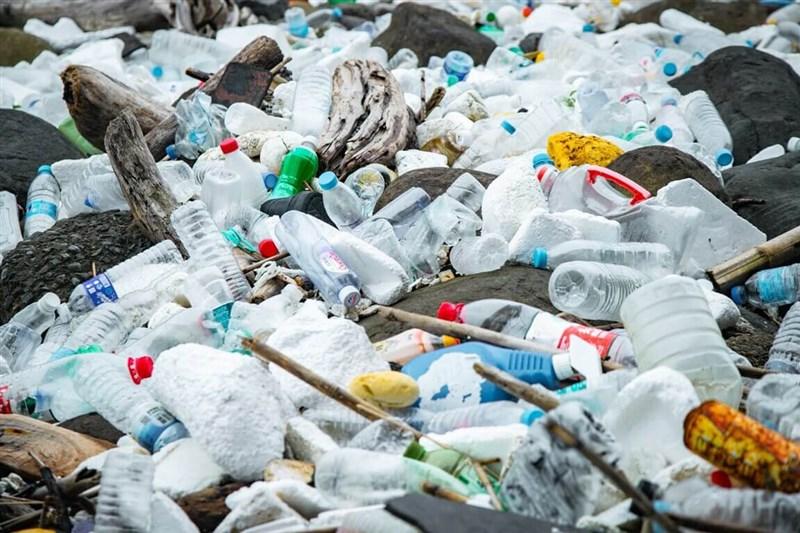Empty water, tea and energy drink bottles are the most common types of beach litter in Taiwan, an environmental group said in a statement today.
According to the Taiwan RE-THINK Environmental Education Association, 8,249 pieces of trash were collected from 59 beaches around Taiwan between April last year and this April, of which empty water bottles made up 28 percent (2,356 pieces).
Empty tea bottles were the second most common, with 1,826 pieces, accounting for 21.7 percent of the total.

Photo courtesy of RE-THINK Environmental Education Association via CNA
In third place were discarded energy drink bottles, 1,313 of which were collected, making up 15.6 percent.
According to the organization, energy drink containers are small and easy to carry, making them popular with anglers and outdoor enthusiasts, but are often made out of glass.
As glass does not biodegrade, many of these containers eventually end up on beaches, the NGO said.
In terms of material types, PET bottles top the chart at 67 percent, or 5,677 pieces, followed by glass bottles at 14.8 percent and steel and aluminum cans at 5.4 percent.
More specifically, over 50 percent of the PET bottles were collected from northern Taiwan — including Taipei, New Taipei, Taoyuan, Hsinchu and Yilan — where nearly 20 percent of beach litter was brought from other countries by sea currents, the most in Taiwan, statistics showed.
The organization called on the public to properly recycle their waste, noting that littering on beaches is punishable by a fine of NT$1,200-NT$6,000 (US$40-US$202) in Taiwan.

TRAFFIC SAFETY RULES: A positive result in a drug test would result in a two-year license suspension for the driver and vehicle, and a fine of up to NT$180,000 The Ministry of Transportation and Communications is to authorize police to conduct roadside saliva tests by the end of the year to deter people from driving while under the influence of narcotics, it said yesterday. The ministry last month unveiled a draft of amended regulations governing traffic safety rules and penalties, which included provisions empowering police to conduct mandatory saliva tests on drivers. While currently rules authorize police to use oral fluid testing kits for signs of drug use, they do not establish penalties for noncompliance or operating procedures for officers to follow, the ministry said. The proposed changes to the regulations require

The Executive Yuan yesterday announced that registration for a one-time universal NT$10,000 cash handout to help people in Taiwan survive US tariffs and inflation would start on Nov. 5, with payouts available as early as Nov. 12. Who is eligible for the handout? Registered Taiwanese nationals are eligible, including those born in Taiwan before April 30 next year with a birth certificate. Non-registered nationals with residence permits, foreign permanent residents and foreign spouses of Taiwanese citizens with residence permits also qualify for the handouts. For people who meet the eligibility requirements, but passed away between yesterday and April 30 next year, surviving family members

Taiwanese officials are courting podcasters and influencers aligned with US President Donald Trump as they grow more worried the US leader could undermine Taiwanese interests in talks with China, people familiar with the matter said. Trump has said Taiwan would likely be on the agenda when he is expected to meet Chinese President Xi Jinping (習近平) next week in a bid to resolve persistent trade tensions. China has asked the White House to officially declare it “opposes” Taiwanese independence, Bloomberg reported last month, a concession that would mark a major diplomatic win for Beijing. President William Lai (賴清德) and his top officials

The German city of Hamburg on Oct. 14 named a bridge “Kaohsiung-Brucke” after the Taiwanese city of Kaohsiung. The footbridge, formerly known as F566, is to the east of the Speicherstadt, the world’s largest warehouse district, and connects the Dar-es-Salaam-Platz to the Brooktorpromenade near the Port of Hamburg on the Elbe River. Timo Fischer, a Free Democratic Party member of the Hamburg-Mitte District Assembly, in May last year proposed the name change with support from members of the Social Democratic Party and the Christian Democratic Union. Kaohsiung and Hamburg in 1999 inked a sister city agreement, but despite more than a quarter-century of